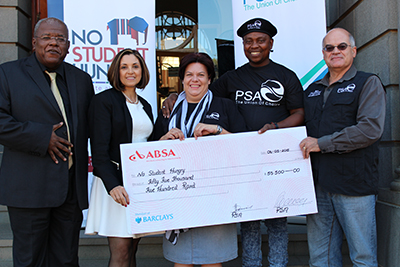Latest News Archive
Please select Category, Year, and then Month to display items
12 October 2020
|
Story Arina Engelbrecht
|
Photo Supplied
 Arina Engelbrecht from Organisational Development and Employee Well-being believes physical activity has a number of benefits for one’s health, including stress relief.
Arina Engelbrecht from Organisational Development and Employee Well-being believes physical activity has a number of benefits for one’s health, including stress relief.
Being physically active plays a big role in preventing the development of mental-health problems and in improving the quality of life of people experiencing mental-health problems.
Treatment for depression
Physical activity can be an alternative treatment for depression. It can be used as a stand-alone treatment or in combination with medication and/or psychological therapy. It promotes all kinds of changes in the brain, including neural growth, reduced inflammation, and new activity patterns are formed that promote feelings of calm and well-being. It releases endorphins – powerful chemicals in the brain that energise your spirit and make you feel good.
Physical activity can be very effective in relieving stress. Research in adults has found that physically active individuals tend to have lower stress levels compared to individuals who are less active. It also leads to improved sleep. When a person sleeps better and feels more rested, overall quality of life improves. They cope better with daily life stressors.
Reduce Alzheimer's risk
Regular physical activity can reduce your risk of developing Alzheimer's disease by up to 50%. It can also slow down further deterioration in those who have already started to develop cognitive problems. It stimulates the brain’s ability to maintain old connections as well as to make new ones.
A study asked people to rate their mood immediately after periods of physical activity (e.g. going for a walk/run, cycling, doing housework) and periods of inactivity (e.g. reading a book or watching television). Researchers found that participants felt more content, more awake, and calmer after being physically active compared to after periods of inactivity.
In conclusion, people who are physically active feel a sense of well-being, feel more energetic throughout the day, sleep better at night, have sharper memories, and feel more relaxed and positive about themselves and their lives.
“Being physically active not only changes your body, it changes your mind,
attitude, and your mood.” – Arina Engelbrecht
No Student Hungry Programme presented with a generous donation
2015-05-18

From Left: Prof Jonathan Jansen, UFS Vice-Chancellor and Rector, Mrs Grace Jansen, Custodian of the NSH, Ms Lynsie Pelser, PSA Free State Social Responsibility Chairperson, Dr Vuyo Dyantyi, PSA President, and Mr Gerhard Koorts, PSA Provincial Manager. |
The Public Servants Association of South Africa (PSA) presented a cheque for R55 500 to the No Student Hungry Programme on 7 May 2015 at the UFS Bloemfontein Campus. The PSA has been a proud supporter of NSH, and of initiatives such as the NSH 1000/33 Stride that saw four volunteers walk from Bloemfontein to Cape Town to raise funds for the programme from the send-off on 1 May 2014 to the welcoming on 3 June 2014 in Cape Town.
On receiving the cheque, Prof Jonathan Jansen, Vice-Chancellor and Rector of the UFS, expressed his gratitude on behalf of the university and all the students who stand to benefit from this initiative.
As a politically non-affiliated union, the PSA’s main focus is labour development and community support throughout the Free State and nationally. The NSH has received a total of R165 000, donated by the union since 2014, which supports more than 25 students.
The President of the PSA, Dr Vuyo Dyantyi, said “Our motto is to invest in human potential, and in programmes that will give the future generation a chance to prosper.”
The No Student Hungry Programme supports more than 130 students each year with daily meals, mentorship, and support on all three campuses.